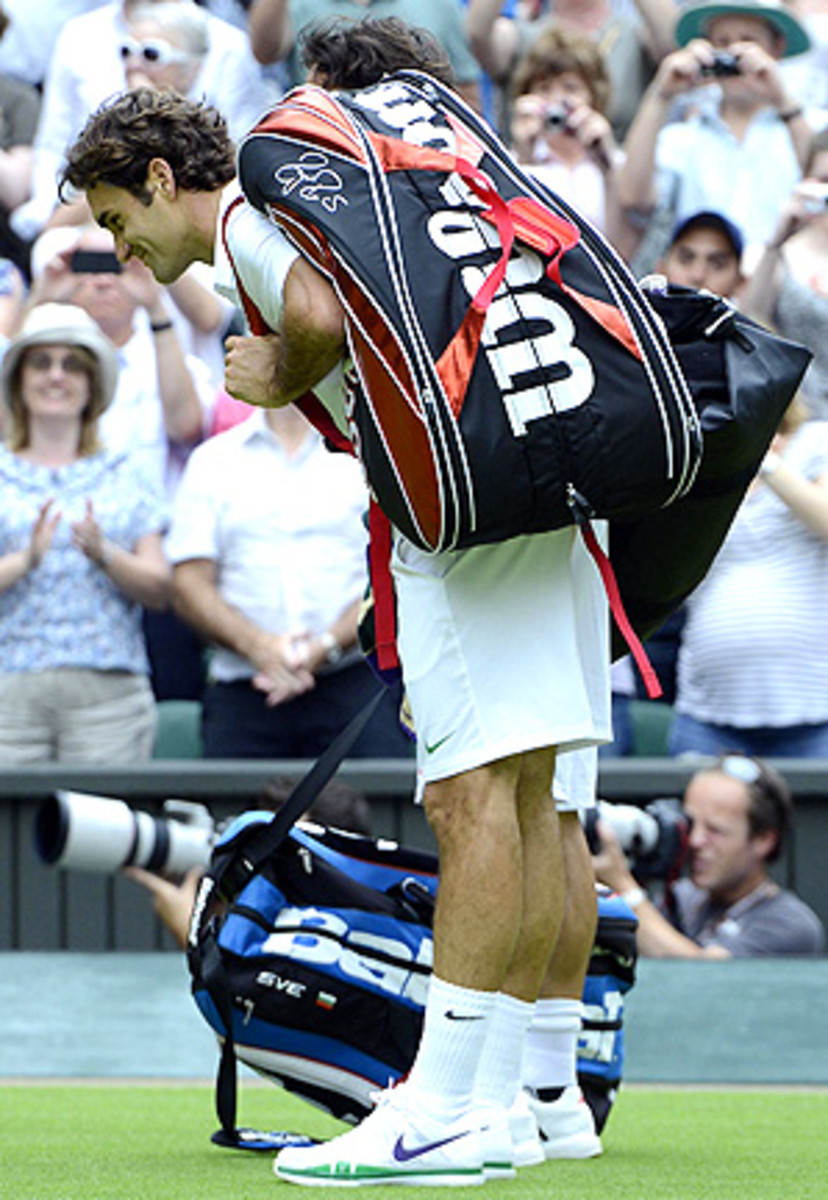Roger Federer's fast pace, clean play elicits awe and respect

Roger Federer politely tips his head towards Prince Charles and the Duchess of Cornwall, who sat front row to watch his match against Fabio Fognini.
REBECCA NADEN/Landov
You can get a little dreamy-eyed watching Federer. To see him on Wimbledon's Centre Court, dispatching a lesser opponent before such an appreciative crowd, you'd be willing to bet he'll never lose again.
The bills will eventually come due, probably late next week, but it was a privilege to see the great man Wednesday in his element, all strokes functioning, moving swiftly about the court like a teenager in his 6-1, 6-3, 6-2 victory over Italy's Fabio Fognini.
At 30, Federer has maintained his game and fitness at a level most players find inconceivable. He's essentially the same guy who won this tournament five years in a row (2003-07), contested Rafael Nadal in what many felt was the greatest match ever played in '08, then came back to win in '09. He hasn't won a major since the 2010 Australian Open because Nadal and Novak Djokovic have so forcefully risen to the occasion in recent years (with perhaps a little luck along the way), and it baffles Federer when people ask if he's near the end of his career.
None of those questions came his way on Wednesday -- the mood of those watching tilted toward awe and respect. Federer still unleashes that whip-like forehand to finish points. He still displays the most effective backhand variety -- topspin here, slice there -- among the game's top players. His first serve is punishing and accurate. I picked Federer to win this tournament, along with SI.com colleagues Jon Wertheim and Courtney Nguyen, and I'm going to feel good about that until further notice.
The grass is starting to turn brown after three days of Centre Court play, but only at the baseline. Gone are the days when the procession of serve-and-volley players caused so much fraying around the net. But that's another element to track as Federer's tournament progresses. He reportedly has it in mind to charge the net when necessary, feeling it might be a strategically sound tactic against the likes of Nadal and Djokovic. This match, against a talented but very erratic opponent, merely demanded Federer's power and consistency from the baseline. Fognini could only smile in admiration at the finish, for he had been decidedly outplayed. Prince Charles was in the first row of the Royal Box, sitting alongside the Duchess of Cornwall, and it seemed quite an appropriate time for him to make his first Wimbledon appearance since 1970.
The match ended all too quickly, but few had any problem with the execution. Both Federer and Fognini enjoy playing quickly, free of excessive deliberation or stall tactics, and it's quite pleasing to the eye. I've never been one to support the notion of a shot clock, but when Djokovic bounces the ball endlessly before serving, or Nadal retreats to wipe his face with a towel after every point (among other time-consuming rituals), people have every right to become exasperated.
"I think [a faster pace] is more enjoyable for the fans," Federer said. "It doesn't matter to me that much, because I have to be able to play fast pace or slow, depending on the opponent. But I think it's nice to speed it up a bit and not go to the end of the 25-second rule we're allowed to use. Taking time between first and second serves, going to towels, picking up balls, all these things, I find it's a bit of a waste sometimes."
As Federer met his vanquished opponent at the net, the crowd broke into sustained applause, leading to a standing ovation. They had watched one of the sporting world's great artists and were delighted to have had the privilege.





